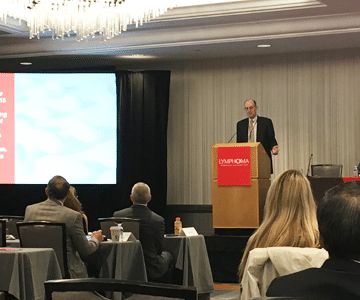Oral Therapies in Lymphoma and Chronic Lymphocytic Leukemia Scientific Workshop Series
To raise awareness of the use of oral therapies in the treatment of lymphoma and chronic lymphocytic leukemia (CLL), the Lymphoma Research Foundation convened two national scientific workshops, seeking to better understand the role these therapies play in the treatment of cancer and the unique opportunities and challenges presented by the use of with oral therapeutic regimens.
The first meeting, held in September 2015, convened national experts from a diverse group of stakeholders including scientists, clinicians, policymakers, regulators, drug developers, and patients, and produced a set of recommendations outlining areas of future study. These included treatment planning and sequencing, combination therapy, and the development of novel targeted therapies. The challenges outlined included adherence, patient monitoring, toxicity management, and cost. Chief among these was adherence, an issue that emerged as likely to impact most other areas of drug development and clinical utility. For this reason, the Foundation’s scientific leadership determined a second meeting focused solely on this important issue was warranted.
In October of 2017, the Foundation convened the Adherence and Oral Therapies in Lymphoma and CLL Workshop. Through invited presentations and roundtable discussions, the faculty and attendees explored the complexities of patient nonadherence to oral anti-cancer therapy. This white paper has been developed to highlight key discussion items from the Workshop, including the ways in which nonadherence may contribute to poor treatment outcomes and lead to increased health care utilization.
Both workshops led the Foundation to develop the very first disease-specific resources focused on assisting patients using oral therapies to treat their lymphoma and CLL. From patient literature to live education programs, the Foundation remains in the cutting edge in both understanding the use of these therapies and providing support to the lymphoma community.
Steering Committee
 Co-Chair
Co-ChairJonathan W. Friedberg, MD, MMSc
James P. Wilmot Cancer Institute
 Co-Chair
Co-ChairMichael E. Williams, MD, ScM
University of Virginia Health System
 Christopher R. Flowers, MD
Christopher R. Flowers, MDUniversity of Texas MD Anderson Cancer Center
 Neil E. Kay, MD
Neil E. Kay, MDMayo Clinic, Rochester
 John P. Leonard, MD
John P. Leonard, MDWeill Cornell Medicine
 Sonali M. Smith, MD
Sonali M. Smith, MDThe University of Chicago
Resources
- “Oral Therapies in Lymphoma: Opportunities and Challenges in Research and Treatment.” Lymphoma Research Foundation. February 2016.
- “Adherence and Oral Therapies in Lymphoma and CLL.” Lymphoma Research Foundation. February 2018.
- LRF Oral Therapy Adherence Scientific Meeting featured in ASCO Post.
- “Foundation’s Oral Therapies Initiative Marks Five Years of Advocacy and Research.” Research Report. Summer 2019.

